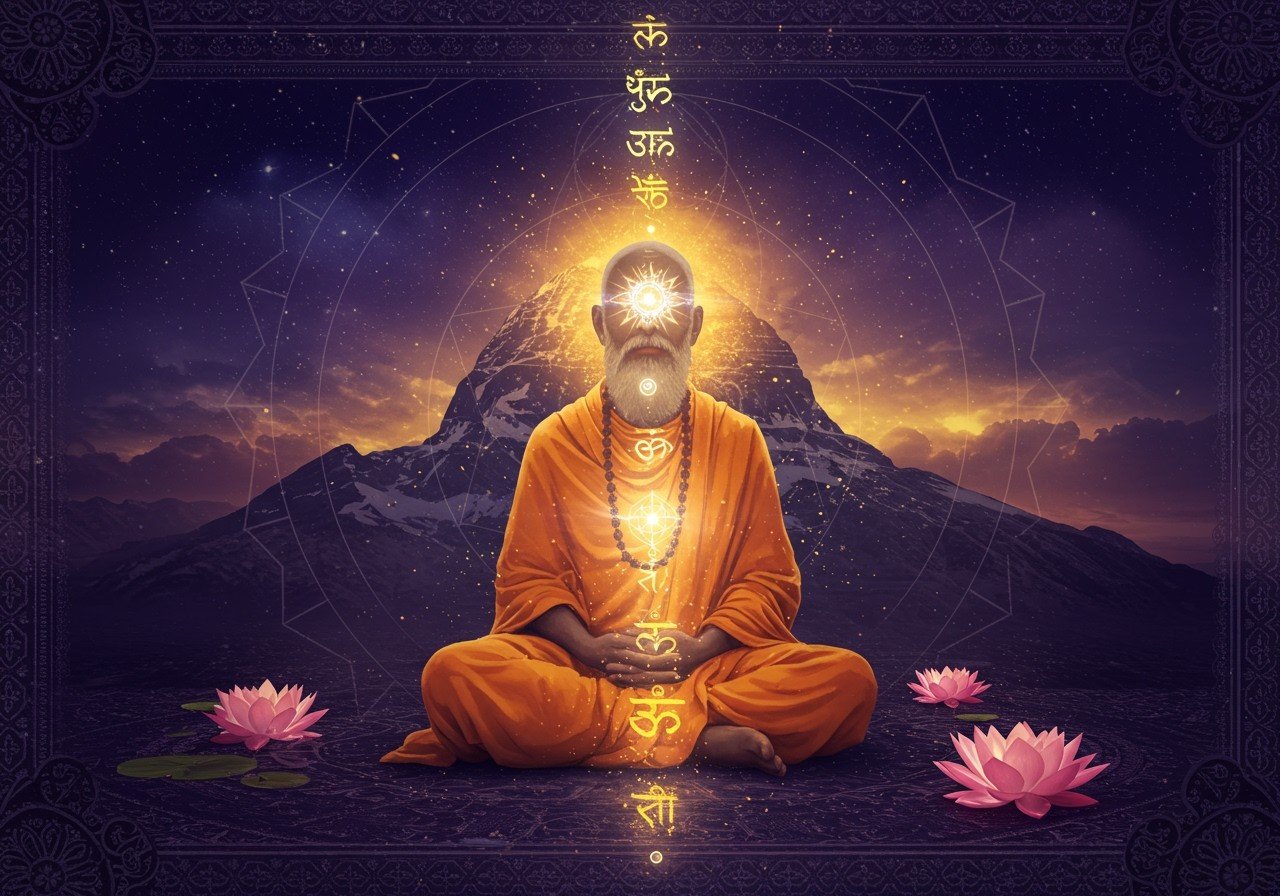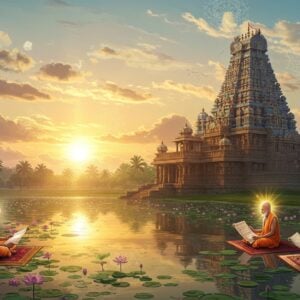Jnana Yoga and Advaita Vedanta: A Path to Self-Realization

In the pursuit of spiritual evolution, many seek pathways that resonate deeply with their heritage. Jnana Yoga and Advaita Vedanta offer profound insights into self-realization and spiritual enlightenment. These ancient Indian philosophical systems guide seekers towards a deeper understanding of their true nature and the attainment of lasting peace and fulfillment. Their timeless wisdom holds particular significance for those who value tradition in our modern world.
Understanding Jnana Yoga
Jnana Yoga, one of the four primary paths of yoga, emphasizes wisdom and knowledge as the route to liberation (moksha). It involves delving into profound questions about the self (Atman) and the universe (Brahman). Self-inquiry (Atma Vichara) is a central practice in Jnana Yoga, leading to the realization that the individual self (Atman) is non-different from the ultimate reality (Brahman).
Key practices in Jnana Yoga include:
- Listening to the teachings of realized masters (Shravana): This involves attentively receiving wisdom from qualified teachers and studying sacred texts.
- Reflecting on these teachings (Manana): Contemplating the teachings and scriptures allows for deeper understanding and integration of the knowledge.
- Deep meditation (Nididhyasana): Through sustained meditation, the insights gained through Shravana and Manana are directly experienced and internalized.
The guidance of a qualified teacher (Guru) is considered essential in Jnana Yoga. Classical texts like the Upanishads and the Bhagavad Gita serve as foundational scriptures for these teachings. For those seeking deeper understanding, poojn.in offers a curated selection of Hindu scriptures.
Advaita Vedanta: The Philosophy of Non-Duality
Advaita Vedanta, a non-dualistic school of Hindu philosophy, posits that the individual soul (Atman) and the ultimate reality (Brahman) are ultimately one and the same. This core principle shapes the concepts and practices of Jnana Yoga. Key tenets of Advaita Vedanta include the illusory nature of the perceived world (Maya) and the understanding that liberation (Moksha) is achieved through the realization of one’s unity with Brahman.
Prominent figures like Adi Shankaracharya have made significant contributions to the Advaita Vedanta tradition. This philosophy resonates with those seeking a rational approach to spirituality, offering profound relevance in today’s world. Explore more about this on Vedas – Ancient Wisdom for Modern Life.
The Path to Self-Realization
The journey of self-realization within Jnana Yoga and Advaita Vedanta involves transitioning from a state of ignorance (Avidya) to a state of knowledge (Jnana). This transformative process culminates in the recognition of the non-dual Self, leading to profound peace and liberation from the cycle of birth and death (Samsara). Challenges may arise along the path, but with perseverance and proper guidance, these obstacles can be overcome.
Practical tips for integrating these teachings into daily life include:
- Mindfulness: Cultivating present moment awareness in all activities.
- Meditation: Regular meditation practice to deepen self-awareness.
- Contemplation: Reflecting on the nature of reality and the self.
Cultural Significance and Modern Relevance
Jnana Yoga and Advaita Vedanta hold deep cultural significance in India, serving as repositories of traditional wisdom. These philosophies align with the values of many culturally rooted Indians who cherish their heritage. In today’s fast-paced world, these ancient teachings provide answers to fundamental existential questions, offering a sense of purpose, meaning, and fulfillment. Check Hinduism: A Celebration of Diversity and Tradition to embrace the rich cultural heritage.
Advaita Vedanta: The Core Concepts
Central to Advaita Vedanta is the concept of non-duality—the understanding that the individual self (jivatman) is ultimately identical to the ultimate reality (Brahman). Self-realization, in this context, involves recognizing this fundamental non-difference and attaining liberation (moksha) from suffering and the cycle of rebirth (samsara).
Key Concepts:
- Brahman: The absolute, unchanging, and all-pervading consciousness that is the ground of all existence. It is the ultimate reality beyond all names and forms.
- Atman: The individual self or soul, which, in essence, is non-different from Brahman. It is the pure consciousness that animates each being.
- Maya: The illusion or veil of ignorance that creates the perception of duality and separateness, obscuring the true nature of reality. It leads to the mistaken identification with the body and mind.
- Avidya: The fundamental ignorance that is the root cause of Maya and suffering. It is the lack of awareness of one’s true nature as Brahman.
- Jivatman: The individual experiencing self, conditioned by the limitations of the body, mind, and senses. It is the Atman under the influence of Maya.
A core practice is self-inquiry—questioning “Who am I?” This seemingly simple question can unravel the illusory nature of the ego and lead to profound insights into one’s true nature.
The Path to Self-Realization in Advaita Vedanta
Advaita Vedanta outlines a path to self-realization that involves several key stages:
- Sravana (Listening): Attentively listening to the teachings of qualified teachers and studying the scriptures lays the foundation for understanding.
- Manana (Reflection): Contemplating and reflecting upon the teachings and scriptures deepens understanding and clarifies doubts.
- Nididhyasana (Deep Contemplation): Sustained and profound meditation allows for direct experience of the non-dual truth. It’s about experiencing the teachings rather than just understanding them intellectually.
- Atma-Vichara (Self-Inquiry): The practice of questioning “Who am I?” helps to dismantle the false identification with the ego and reveal the true nature of the self as pure consciousness.
- Living a Dharmic and Sattvic Lifestyle: A lifestyle aligned with ethical principles (Dharma) and purity (Sattva) supports the journey toward self-realization. This includes practices like mindful eating, moderate exercise, and cultivating virtues like compassion and non-violence. Poojn.in offers a range of products, including Tulsi malas and Shiva Lingams to facilitate your practice.
- Disidentification: Gradually detaching from the identification with the body, mind, and senses. This involves recognizing that thoughts, emotions, and experiences are temporary and do not define one’s true nature.
- Understanding ‘Tat Tvam Asi’ (Thou art That): Realizing the profound meaning of the Mahavakya “Tat Tvam Asi,” which signifies the non-duality between the individual self (tvam) and the ultimate reality (tat).
The Fruits of Self-Realization
The culmination of the path of Advaita Vedanta is self-realization, which brings about profound transformation:
- Liberation (Moksha): Freedom from suffering and the cycle of birth and death (samsara). This liberation is not a distant future event but a realization of one’s inherent freedom.
- Self-Knowledge: Deep and direct knowledge of one’s true identity as Atman/Brahman. This is not merely intellectual understanding but a lived experience.
- Clarity and Compassion: A fundamental shift in perspective, leading to increased clarity, compassion, and a sense of interconnectedness with all beings. Life is experienced with greater depth and meaning.
- Alleviation of Suffering: Overcoming the existential angst and suffering that arise from the misidentification with the limited self. This leads to a profound sense of peace and contentment.
- Shift in Identity: A subtle yet profound shift in identity from the apparent individual person to pure awareness itself. This involves recognizing the true self as the witness of all experiences. Learn more on Find Your Guru.
Advaita Vedanta offers a timeless path to self-discovery and liberation, guiding seekers toward peace and fulfillment in a world often marked by uncertainty and change. It is a call to turn inward and discover the boundless wisdom that resides within.
FAQs on Jnana Yoga and Advaita Vedanta
What is Jnana Yoga?
Jnana Yoga, the “Yoga of Knowledge,” is a spiritual path focused on self-realization through inquiry, study, and contemplation. It encourages deep questioning of the nature of reality and the self.
How does Jnana Yoga relate to Advaita Vedanta?
Advaita Vedanta, a school of Hindu philosophy, provides the philosophical framework for Jnana Yoga. It posits the non-duality of the individual self (Atman) and the ultimate reality (Brahman), which Jnana Yoga aims to realize through direct experience.
Why is self-realization important in Jnana Yoga?
Self-realization is the ultimate goal of Jnana Yoga. It leads to liberation (moksha) from suffering and the cycle of birth and death by revealing one’s true nature as pure consciousness.
What are the key practices in Jnana Yoga?
Key practices include self-inquiry (Atma Vichara), meditation, study of scriptures like the Upanishads and Bhagavad Gita, and contemplation on the teachings of realized masters. More information on Ramcharitmanas.
Can anyone practice Jnana Yoga?
While Jnana Yoga is open to all, it requires a certain level of intellectual maturity, dedication to self-inquiry, and a yearning for spiritual understanding.
How does Jnana Yoga differ from other types of yoga?
Unlike other paths like Bhakti Yoga (devotion) or Karma Yoga (action), Jnana Yoga primarily emphasizes knowledge and wisdom as the means to liberation. However, all yogic paths ultimately converge towards the same goal.
What role do teachers play in Jnana Yoga and Advaita Vedanta?
A qualified teacher (Guru) plays a crucial role in guiding students through the intricacies of Jnana Yoga and Advaita Vedanta. They offer clarification, dispel doubts, and provide insights that facilitate self-realization. You can find a range of resources including camphor and bel malas on Poojn.in to support your spiritual practices.
Embark on your spiritual journey today with the support of Poojn.in. Visit our website for a wide selection of spiritual products and resources to deepen your practice.


